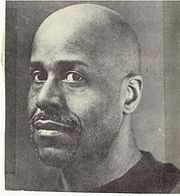
Martin Sostre
Encyclopedia

He served time in Attica prison during the early 1960s, where he embraced doctrines as diverse as Black Muslimism, Black Nationalism, Internationalism, and finally anarchism. In 1966 Sostre opened the Afro-Asian Bookstore in the black ghetto of Buffalo, New York. He is still alive and living in Manhattan with his wife Lizabeth Sostre and his sons Mark and Vincent Sostre.
For its somewhat short existence, Sostre's bookstore was a center for radical thought and education in the Buffalo
Buffalo, New York
Buffalo is the second most populous city in the state of New York, after New York City. Located in Western New York on the eastern shores of Lake Erie and at the head of the Niagara River across from Fort Erie, Ontario, Buffalo is the seat of Erie County and the principal city of the...
ghetto. As Sostre details:
I taught continually - giving out pamphlets free to those who had no money. I let them sit and read for hours in the store. Some would come back every day and read the same book until they finished it. This was the opportunity I had dreamed about - to be able to help my people by increasing the political awareness of the youth
Arrested on July 14, 1967, at his bookstore, for "narcotics, riot, arson, and assault" (charges later proven to be fabricated, part and parcel of a COINTELPRO
COINTELPRO
COINTELPRO was a series of covert, and often illegal, projects conducted by the United States Federal Bureau of Investigation aimed at surveilling, infiltrating, discrediting, and disrupting domestic political organizations.COINTELPRO tactics included discrediting targets through psychological...
program in full swing), and convicted and sentenced to serve forty-one years and thirty days, Sostre became a jail house lawyer and regularly acted as legal council to other inmates, including winning two landmark legal cases involving prisoner rights: Sostre v. Rockefeller and Sostre v. Otis. According to Sostre, these decisions constituted "a resounding defeat for the establishment who will now find it exceedingly difficult to torture with impunity the thousands of captive black (and white) political prisoners illegally held in their concentration camps."
In earlier legal activity, Sostre secured religious rights for Black Muslim prisoners and also eliminated (in the words of Federal Judge Constance Motley) some of the more "outrageously inhuman aspects of solitary confinement in some of the state prisons.".
Lorenzo Kom'boa Ervin attributes his initial interest in anarchism to Sostre.
In 1974 Pacific Street Films
Pacific Street Films
Pacific Street Films is a documentary film production company founded in Brooklyn, New York in 1969 by anarchists Joel Sucher and Steven Fischler...
debuted a documentary film on Sostre called Frame-up! The Imprisonment of Martin Sostre. It detailed Sostre's case with extensive interviews from prison.
See also
- Anarchist Black CrossAnarchist Black CrossThe Anarchist Black Cross is an anarchist politics support organization. The group is notable for its efforts at providing prisoners with political literature, but it also organises material and legal support for class struggle prisoners worldwide...
- anarcho-communism
- Black anarchismBlack anarchismBlack anarchism opposes the existence of the state and the subjugation and domination of people of color, and favors a non-hierarchical organization of society. Black anarchists seek to abolish white supremacy, patriarchy, capitalism, and the state...
- libertarian socialismLibertarian socialismLibertarian socialism is a group of political philosophies that promote a non-hierarchical, non-bureaucratic, stateless society without private property in the means of production...
- SostreSostreSoster is a surname of Scandinavian origin, possibley related to the Norwegian mountains called Syv Sostre .2. Surname of Spanish or Italian origin...

